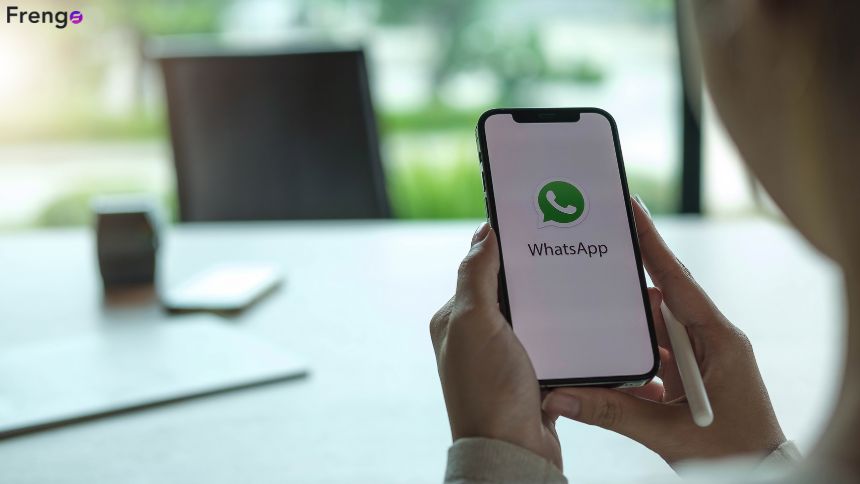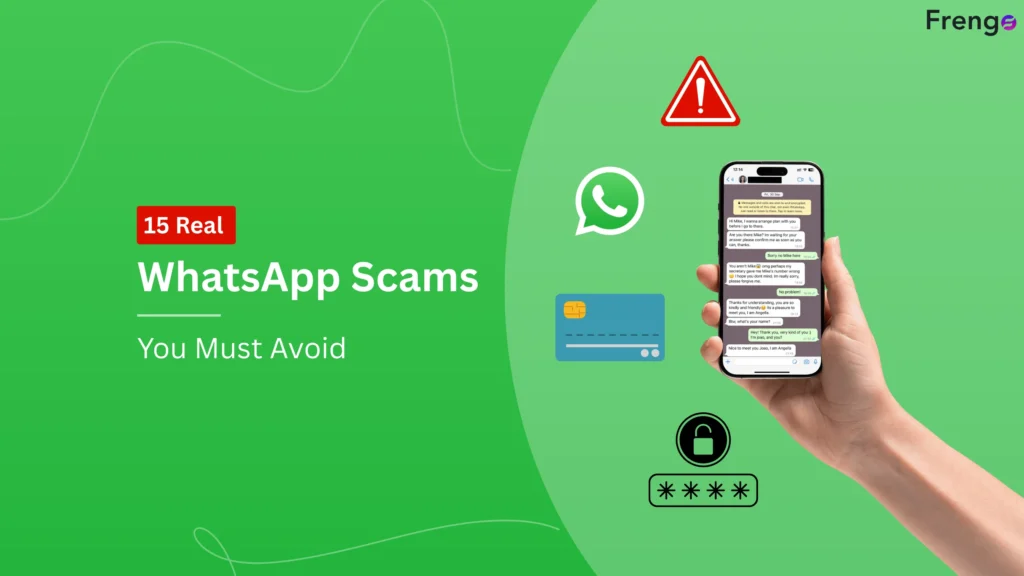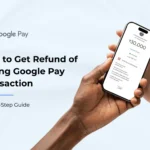WhatsApp is one of the most popular messaging apps worldwide, connecting billions of people every day. But with popularity comes a greater risk. In 2025, scammers are using advanced and more believable tricks than ever to trick people, steal their hard-earned money, or obtain sensitive personal information. Scammers use various tactics, from phishing links to impersonation scams to fake job offers, and in general, these WhatsApp Scams are quickly evolving to target all users, regardless of age.

Unfortunately, nobody is entirely safe scams can happen to students, working professionals, small business owners, and even those who are tech-savvy. This is why awareness is the best prevention. This article guide and show you the 15 biggest and most dangerous WhatsApp scams circulating, but more importantly, how to recognize these scams early and protect yourself and your family from falling into their trap.
How to Spot a WhatsApp Scammer
WhatsApp, with its 3 billion active users worldwide, is a go-to app for chatting with friends, family, and colleagues. But its massive popularity also makes it a favorite playground for scammers. In January 2025, WhatsApp banned over 99 lakh (9.9 million) accounts in India to combat scams and misuse.
The good news? You don’t have to be a victim. Most WhatsApp scams follow familiar patterns. Once you know the red flags, it becomes much easier to recognize a scam before it’s too late.
Common Warning Signs of a WhatsApp Scammer
If you’re unsure whether a message is real or fake, here are 8 clear signs that you’re dealing with a scammer on WhatsApp:
- They Try to Create Urgency
- They Ask for Money, Gift Cards, or Bank Transfers
- Fake Job Offers That Sound Too Good to Be True
- Their Profile Picture Looks Suspicious
- They Send Unverified Links
- They Avoid Voice or Video Calls
15 Common WhatsApp Scams and How to Avoid Them
WhatsApp scams are more common than ever in 2025, and it’s important to know what to look out for. In this section, we’ll share 15 common scams and simple tips to help you stay safe.
1. Fake Job Offers
Many people are looking for flexible or remote work, and scammers are trying to take advantage of this. They disguised themselves as recruiters for Amazon, TCS, Wipro, and other top companies and sent WhatsApp messages about job offers. The messages tend to be real, showing as legitimate advertisements with logos, job descriptions, and even fake offer letters.
The scammer may say you’ve been selected without an interview and then ask for your documents, like your Aadhaar or PAN card, for “verification.” In most cases, they also demand a small fee for registration, background checks, or training. Once you pay, they stop replying, and your personal data is at risk of being misused or sold.
✅ How to avoid: Always verify job offers from official company websites or LinkedIn. Never pay for a job offer because legitimate companies never charge job seekers for selection processes. Verify the recruiter’s email address and phone number from their company site.
2. Gift Card or Cashback Scams
Scammers send out viral messages that you have won a ₹5000 or more gift card from companies like Swiggy, Flipkart, or Amazon. These messages often come with a link that looks genuine and say things like “Hurry, only 100 gift cards left!” When you click the link, you are brought to a fake website that requests your personal information—name, phone number, email address, or even banking information—in order to “credit” your prize.
Some of these URLs also infect your phone with malware, which gives criminals the ability to monitor your communications or steal your login information.
✅ How to avoid: Don’t trust messages promising free vouchers or prizes unless confirmed by the brand’s official website or app. Avoid clicking links from unknown numbers or forwarded messages.
3. OTP Hacking Scam
This scam gets you to share your WhatsApp one-time password (OTP) with someone posing as a friend or family member. You may receive a message like, “Hey! I accidentally sent my OTP to your number. Can you please send it back to me as soon as possible?” In truth, this OTP is for accessing your WhatsApp account. If you share it, a scammer can take over your account, lock you out, and use up your profile to take money from your friends.
The scam is often carried out by posing as you and requesting money or private information from other people you know. Recovering a hacked WhatsApp account may be stressful and time-consuming.
✅ How to avoid: Never share an OTP with anyone, no matter how convincing the story sounds. Even if the message comes from a trusted contact, call them directly to verify. Enable two-step verification for extra protection.
4. Loan Approval Scam
In this scam, people receive WhatsApp messages for instant personal loans that are being presented as “no credit checks”, “fast approval” and “low-rate interest.” For people needing money urgently, these loans look tempting. Scammers use the names of real NBFCs (non-banking financial company) or banks with documents that look legitimate with company logos and stamps. Once a person has shown interest, the scammers ask for personal documents which generally include Aadhaar, PAN, and salary slips and request a amount in the range of ₹500 to ₹2,000 as a “processing fee” and “registration fee”.
After the fee is paid, either the scammer disappears or continues to ask more fees. Victims not only lose money but also risk identity theft due to shared documents.
✅ How to avoid: Real banks and NBFCs never ask for money upfront over WhatsApp. Always apply for loans directly from the company’s website or app. Check if the lender is registered with RBI before sharing any details.
5. WhatsApp Gold or Premium Upgrade Scam
The WhatsApp Gold scam came back in a new form in 2025. Scammers sent messages saying that you could unlock ”WhatsApp Gold” or ”Premium” with features like scheduling messages, customizing themes, or invisible mode, etc., and they would then send you a link to download that version. When users would click on the link, they would be sent to a fake version of the app or would be prompted to install an application that would steal data from the phone.
In some cases, the user would download an actual version of WhatsApp Gold, and it would have spyware installed that would allow the hacker to monitor their calls, messages, and activity on applications. Most victims are not aware there is spyware installed and will not realize they are being watched until an account is compromised or money is stolen.
✅ How to avoid: WhatsApp does not offer a premium or paid version. Any message suggesting special features or upgrades is fake. Only update WhatsApp through the Play Store or App Store.
6. Fake Friend or Relative Asking for Help
With this scam, someone uses your friend’s or relative’s name and picture, usually downloaded from their Facebook or Instagram profile, and creates a WhatsApp profile. They then send you a message saying they are in an emergency and require money urgently, such as for a hospital bill or to pay a cab. Many people feel secure transferring money to friends and family as the source of the request appears to be from someone familiar.
Most scammers want you to send money using UPI links, gift cards, or bank transfers and will disappear shortly after receiving your money. This scam also exploits someone’s emotions, especially regarding the message, “Please don’t tell anyone.”
✅ How to avoid: Always call or video call the person to verify their identity, especially if calling from a number you don’t recognize. Called from a reputable number? Be careful even if their profile photo is someone you know. Never send money based only on a chat.
7. Donation & Charity Scams
In times of disaster, medical emergencies, or public crises, donation scams increase. Scammers circulate emotional videos or images and ask for donations to support children with cancer, disaster relief, or disabled people. They include a UPI ID or bank account and promise that “every rupee counts.” Because of the emotional appeal and the social nature of WhatsApp groups, many people fall into the trap and donate without verifying the cause.
These scams are dangerous because they take advantage of people’s kindness, and worse, genuine charities may lose support as trust decreases.
✅ How to avoid: Only donate through trustworthy sites and verified charities like GiveIndia, Milaap, their official site or NGOs verified in the charity registers. Search for their registration details, PAN cards, or government-approved funding before sending any money. Do not send money through UPI links shared on WhatsApp by an unknown person.
8. Fake Lottery or Contest Winnings
“You’ve won ₹25 lakh in the WhatsApp Anniversary Lottery!”—this message has fooled thousands. Scammers send fake messages claiming you’ve won a huge cash prize from WhatsApp, Google, or another big company. They ask you to contact a “claim agent” or send personal information, and later demand money for GST, transfer fees, or customs clearance.
Victims often send small amounts in the hope of receiving a big prize, but the scammer keeps demanding more and never delivers. In some cases, scammers also use phishing links to steal banking passwords during the “verification” process.
✅ How to avoid: If you didn’t participate in a contest, you didn’t win anything. No legitimate company gives away money through random WhatsApp messages. Don’t pay any fee to claim a prize.
9. Recharge or Free Data Trap
Scammers send WhatsApp messages claiming your phone number has been selected to win free recharge, 5GB of extra data, or ₹100 cashback. It usually says your from either Jio, Airtel, or VI and links for you to claim your winnings. The link will either try to get your personal information – like your number and OTP, or carry malware that obtains spying on your phone activity.
In some cases, clicking the link auto-subscribes you to paid services, silently deducting money from your mobile balance.
✅ How to avoid: Do not click links promising free data or money. Always check such offers on the official telecom app (MyJio, Airtel Thanks, etc.). No genuine company runs such promotions through random messages.
10. Investment & Crypto Group Traps
The WhatsApp groups giving stock market tips, crypto contributions, or “quick income” are a major risk. Scammers lure you into groups with convincing fake success stories, fake screenshots of profits and testimonials to establish trust, then continuously refer to go to a platform or app where you can “invest and make daily returns”.
Then once you deposit money, they freeze your account, block your ability to withdraw or simply disappear. Some even run Ponzi schemes, where old users are paid from new investors’ money-until it collapses.
✅ How to avoid: Never invest based on WhatsApp advice. Research properly, and only invest in platforms registered with SEBI or other legal bodies. Avoid schemes that promise fixed daily returns—they’re usually scams.
11. Fake Customer Support Numbers
When people struggle with issues with payment apps such as Paytm, PhonePe, or Amazon, they often go to the internet for support help on Google, and that is where scamsters come in. Scamsters create fake websites and circulate screenshots of fake customer care numbers on WhatsApp.
When you call the number, they try to help you but convince you to share sensitive information such as your card numbers, OTPs, or UPI PIN. Some will make you download remote access apps to control your phone resources such as AnyDesk.
✅ How to avoid: Always look for support only on the brand’s official website or app. Do not trust any numbers shared in WhatsApp messages, and do not share screen or access with unknown people.
12. Online Romance & Relationship Scams
Scammers make fake profiles with attractive photos and start chatting with people on WhatsApp as NRIs, models, or army officers. They build trust over a few days or weeks, then they make an emotional request for help like they need money to buy a flight ticket, a gift stuck at customs in your city or there is a family emergency.
Most victims of scams, especially lonely victims, see themselves as emotionally attached to the person, so they send money multiple times believing they are helping someone they care about.
✅ How to avoid: If someone you’ve never met is asking for money, it’s a red flag. Do a reverse image search on their photo and check if the profile exists on scam report sites. Don’t send money to strangers.
13. Verification Link Scam
You receive a message saying your WhatsApp account is “under review,” or it may be “deleted in 24 hours” unless you verify. The link in the message takes you to a fake WhatsApp login page where you’re asked to enter your number and verification code. After you did that, the scammer accessed your account, changed the login information, and may lock you out entirely. The fake messages typically always create urgency and fear to get you to act quickly.
✅ How to avoid: WhatsApp never sends messages through chat asking for verification. All updates and warnings are sent through the official app, not via forwarded messages or links. Ignore and report such messages.
14. Fake Government Scheme Scams
Scammers exploit well-known government schemes such as PMAY, Jan Dhan, or Ayushman Bharat. They send WhatsApp messages claiming that you have been selected or prequalified for benefits such as free housing, a cash award of ₹5,000, or a new ration card.
The messages often include forms or links requiring your Aadhaar, mobile number, and bank account. After you fill them out, the scammers either misuse that information or, in many cases, ask you to pay a small “processing fee”.
✅ How to avoid: All official government schemes are listed on gov.in. Avoid messages not coming from government handles. Don’t share personal documents via WhatsApp.
15. QR Code Payment Scams
Scammers say they want to pay you—maybe for a product or a service—and send you a QR code. But when you scan it thinking you’ll receive money, your account is charged instead. This trick works on people who don’t understand how UPI works. Many believe scanning a QR code can receive money, which is false.
✅ How to avoid: You only scan QR codes to send money, not to receive it. If someone says otherwise, it’s likely a scam. Always double-check the transaction screen before approving any UPI payment.









